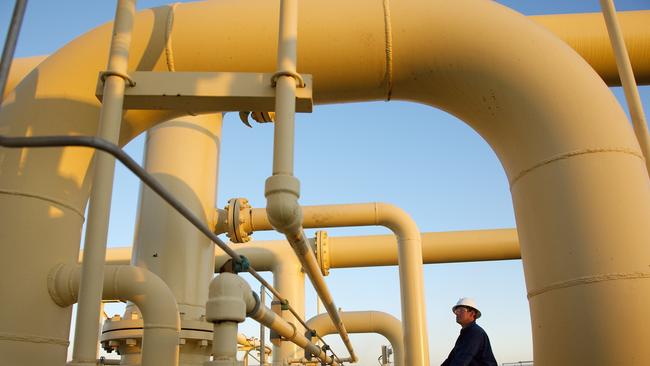Oil Search slashes spending as oil tanks
The oil price crash sparked the first major cost-cutting by an Australian energy producer on Wednesday.

The oil price crash sparked the first major cost-cutting by an Australian energy producer on Wednesday as Oil Search slashed its spending by 40 per cent in a bid to conserve cash after warning of “unprecedented times” in markets.
The Sydney producer, reeling from a 70 per cent plunge in its share price since January, suspended a sale of its Alaskan oil project and will dramatically cut costs amid investor concern over its ability to handle a hefty debt burden.
Spending for 2020 would drop to $US440m ($735m) to $US530m from a prior $US710m to $US845m projection.
Further cuts could be put in place for 2021 if lower oil prices persist.
Crude has fallen to a four-year low below $US30 a barrel, piling pressure on energy companies. Oil Search shares fell 7.9 per cent to $2.44.
“While Oil Search is fortunate to have world-class assets, these unprecedented times require us to take immediate and decisive steps to position us for a potentially extended period of lower oil prices and business uncertainty,” Oil Search managing director Keiran Wulff said.
Still, one of the company’s investors said the company should have gone further.
“They need to cut and this is nowhere near the bone. Nowhere near,” Allan Gray managing director Simon Mawhinney told The Australian.
Some of the industry’s biggest names were caught in the sector sell-off with Origin Energy tanking 14.4 per cent to $4.40, Santos shedding 12.3 per cent to $3.13 and Woodside Petroleum down 8.8 per cent to $17.23.
Energy-focused contractor Worley was also struck by a big sell-off on Wednesday with its shares tumbling 23 per cent as Brent crude crashed, off by more than half since the start of the year.
Shareholders are nervous about the ability of companies including Oil Search to stay within their debt covenants should crude prices remain low for an extended period.
Tapping Oil Search investors for fresh equity may need to be considered, Bernstein said. “While free cash flow breakeven has fallen to $US32 a barrel it will be impossible for Oil Search to fund growth at current prices. Either oil prices will have to rise, or an equity raise is required,” Bernstein said.
Revised guidance on operating costs will be issued once the deferral of capital projects and restructuring costs has been quantified.
The planned sale of a 15 per cent stake in its Alaskan assets has been suspended although talks continue with several parties.
All work on developing an early production system for its Pikka oil unit in Alaska has also been placed on hold.
Talks are continuing on the company’s planned PNG expansion although work on the development will slow.
“At present, we have assumed that activities on LNG expansion are minimal. If agreement on P’nyang terms is reached and the joint ventures move into the FEED phase in 2020, it is anticipated that spend on the projects would be modest over the balance of the year,” Oil Search said in a statement.
Worley also looks exposed as a leading contractor to the energy sector. Its $4.6bn takeover of Jacobs last year eased its dependence on oil and gas by adding more chemicals exposure, the contractor is still subject to big swings in the commodity cycle as energy companies urgently work to cut discretionary spending.
Oil and gas now accounts for about 47 per cent of its earnings with chemicals at 43 per cent.
JPMorgan cut Worley’s 2020 net profit forecast by up to 25 per cent, reflecting market uncertainty and downgraded the company to a neutral rating.
“Our previous investment case has been significantly challenged and we do not necessarily believe there is strong near-term growth any more.”
The energy sector is now in “survival mode”, consultancy Wood Mackenzie said. “The biggest blow will be felt in Australia where companies are aiming to sanction large, strategically important backfill LNG investments in 2020. Significant projects in Southeast Asia will also be pushed back,” Gavin Thompson said.
It sees $US35bn of spending at risk across Asia-Pacific in the 2020 to 2022 period.
Woodside’s Scarborough LNG project and Santos’s Barossa development are seen in danger.
“Prior to the oil price crash, Santos and Woodside were already looking to farm-down their respective equity exposures.”




To join the conversation, please log in. Don't have an account? Register
Join the conversation, you are commenting as Logout